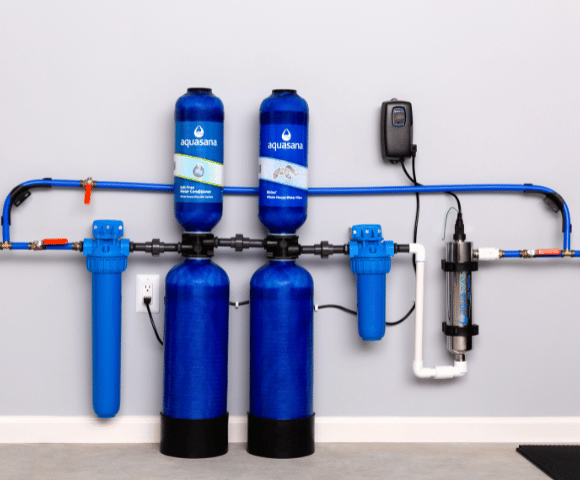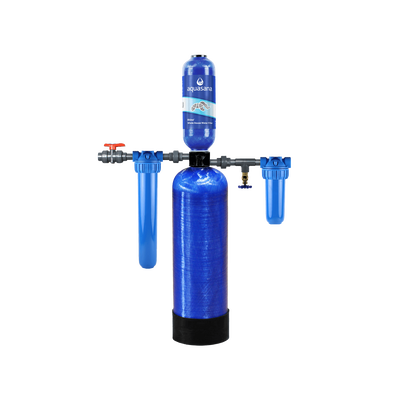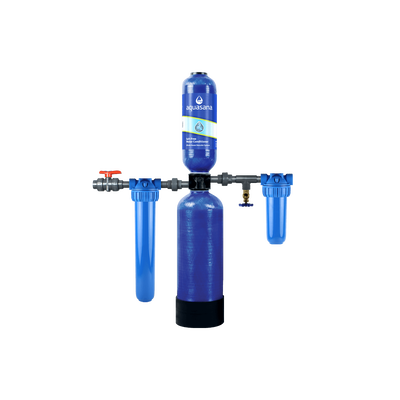The main difference between water softeners and descalers
Before we jump into the specifics of water softeners and descalers and which option is best for you, we’ll quickly cover the main difference between these systems.
The primary difference between a water softener and a water descaler is the way each system addresses hard water. Water softeners remove hard water minerals, while water descalers alter the chemical structure of hard minerals to render them harmless. Both systems serve the same purpose, though water softeners offer additional power that may be needed to address moderately hard water.
What is a water softener?
Water softeners remove minerals like calcium and magnesium from hard water using a process called ion exchange, preventing any form of scale buildup and or issues associated with hard water.
Softeners are installed at your home’s main water line and consist of two tanks: one containing resin beads charged with sodium ions from salt pellets, and another containing a brine solution. Hard water enters the tank with the resin beads, and as it passes over the beads calcium and magnesium ions in the water get swapped with the sodium ions from the beads — effectively removing the hard minerals. The second tank with the brine solution recharges the resin beads with sodium ions to clean them through a process known as regeneration, and the solution is made by adding salt pellets.
Water softeners are one of, if not the most effective ways to address hard water. However, they do require a little maintenance from replacing the salt on a regular basis. Additionally, these systems require electricity to run and generate wastewater, which makes them less eco-friendly than alternatives like a descaler. Some states and municipalities also have laws about if, or how a softener can be used.
What is a water descaler?
A water descaler, also known as a water conditioner, is an alternative to softeners that addresses hard water by changing the chemical composition of hard water minerals to render them harmless. With a descaler, hard minerals aren’t removed, they’re just altered through a process called template-assisted crystallization (TAC) so the minerals can’t bind and form scale. The hard minerals are transformed into harmless crystals that you won’t be able to see or feel in your water.
Water descalers don’t require much maintenance because they don’t use salt, and they’re also more eco-friendly because they don’t generate wastewater or rely on electricity. The main drawbacks behind them are that they aren’t as effective compared to alternatives like a water softener, and they tend to have a higher upfront cost.

Should you choose a water softener or water descaler?
It all just depends on what’s right for you. If the water hardness in your home is below 15 GPG (grains-per-gallon) hardness levels, a water descaler may take care of most of your problems. With a water hardness above 15 GPG, a water softener may be needed.
Water softeners are generally more powerful and cheaper, but are less eco-friendly and require more maintenance than water conditioners. Whatever you choose, Aquasana has great systems to suit your preferences.
Our Salt-Free Water Conditioner (the same thing as a descaler) has a lifespan of up to 1,000,000 gallons or 10 years without requiring salt, electricity, or generating wastewater. If you opt for a softener, our SimplySoft® 40K & 60K Grain Softeners are IAPMO certified to NSF/ANSI Standard 44 for the reduction of water hardness and they use 50% less salt and generate 28% less wastewater than traditional softeners. For any questions about which system is best for you, contact our Water Experts for help.
WHOLE HOUSE WATER SOFTENER
SimplySoft® 40,000 Grain Softener
Reduces minerals that cause hard water, providing softer, scale-free water from every tap in your home.
.png)


